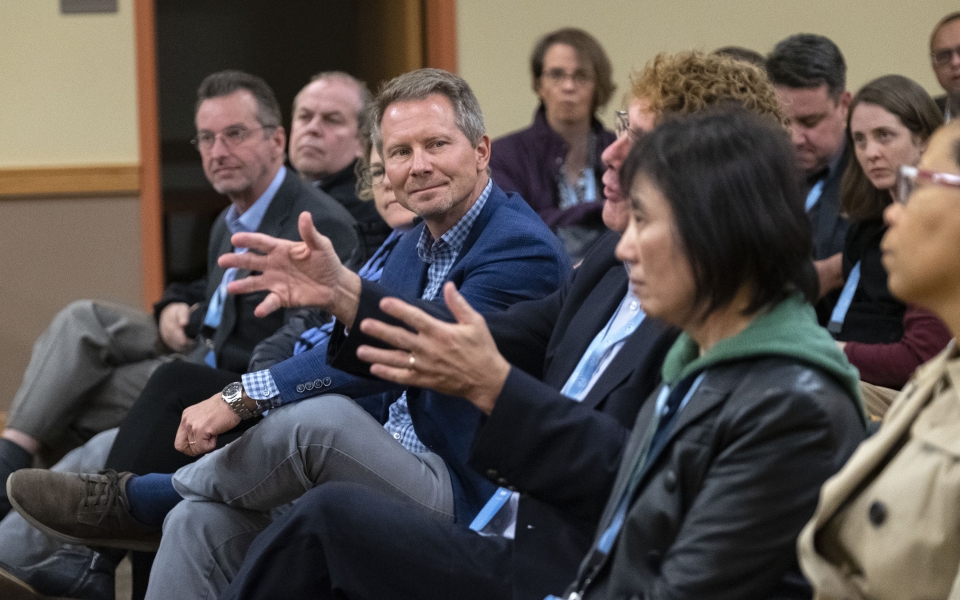In October 2019, Stephen R. Hooper, Vicki Stemmons Mercer ’88, and Nancy Bagatell were among 90 leaders from UNC-Chapel Hill on the Tar Heel Bus Tour, a three-day tour that spanned more than 1,000 miles as part of an experience designed to connect with and learn from communities in our state.
Hooper, Mercer, and Bagatell said they returned to Chapel Hill with a renewed and reinvigorated perspective on partnerships and community work across the state.
Western Route
Hooper, the department’s chair and associate dean, traveled in Western North Carolina, with stops at the UNC Nutrition Research Institute, the South Mountains State Park, and in Cherokee Nation.
“These are marvelous resources for our state. There were several stops with UNC-CH connections and great potential for more,” Hooper said.
During the final leg of the western route, Hooper learned about partnerships in Wilkes County that are addressing the opioid crisis, and toured Morehead High School where he learned about the College Advising Corps, which he called an important pool of future UNC-CH students. The trip ended at UNC Rockingham Health Care, which highlighted rural health care initiatives. The Physician Assistant Studies program, housed in the DAHS, has a focus on rural health care and UNC Rockingham served as a great example for potential future placement of students.
Southeastern Route
Mercer, an associate professor in the Division of Physical Therapy, traveled on the Southeastern bus. Mercer said she was most influenced by stops in Robeson County. In Lumberton, the county seat, participants learned about devastating effects that hurricanes have had on residents. She explained that the low-lying areas of Lumberton are populated by people with limited economic resources and have faced issues with contaminated drinking water and mold. Lumbee hosts showcased traditional dances and also discussed challenges facing the Lumbee tribe.
“We learned a lot about what UNC-CH has done to address concerns of North Carolinians living in the southeastern part of the state,” Mercer said.
Mercer is also the director of the Human Movement Science Curriculum, a PhD program jointly offered with the Department of Exercise and Sport Science. She said a stop at Fort Bragg reiterated the importance of research on concussion among military populations, a study led by Karen McCulloch in the division. Mercer also shared that she had a better understanding of ways to champion their research, which fulfill unique needs and are complimentary in providing support for regular enlisted and special operations personnel. Mercer said the bus tour allowed her to explore opportunities for future collaboration with Community Health and Mobility Partnership (CHAMP), a falls prevention program she launched in 2009 in order to improve strength, balance, and mobility among older adults living in underserved areas.
Eastern Route
Bagatell, the director of the Division of Occupational Science and Occupational Therapy, traveled in Eastern North Carolina as part of the bus tour. She found stops in Kinston, North Carolina, to be most impactful; the town is largely African American with a high rate of poverty. Natural disasters, such as hurricanes and flooding, in addition to economic changes, such as in the textiles and tobacco industries, have led to additional hardships. Bagatell said she learned about race and its impact in daily life.
“The intersections of race, economy, climate change, etc., became more evident as we toured parts of Eastern North Carolina,” Bagatell said. “I feel even more committed to helping students understand the impact of history and policy on everyday occupations of people living across the state, especially those in rural areas.”
She said she hoped to ensure that all students in Occupational Therapy and Occupational Science will have the opportunity to complete a rotation in a rural area.
Bagatell, Hooper, and Mercer all shared that the Tar Heel Bus Tour increased a sense of camaraderie among faculty at the University.
“I enjoyed meeting faculty and staff from across the University—from public health to arts and humanities to athletics—and I learned a lot about UNC-CH and the state through both information and formal discussions,” Bagatell said. “I learned a lot from faculty about the level of commitment it takes to truly partner with community members.”
Nancy Bagatell, PhD, OTR/L, FAOTA, has served as division director in the Division of Occupational Science and Occupational Therapy since 2017. Vicki Stemmons Mercer, PT, PhD, has received numerous honors for CHAMP. Stephen R. Hooper, PhD, has served as DAHS chair and associate dean since 2013. Karen McCulloch, PT, PhD, is also a fellow of the American Physical Therapy Association.


